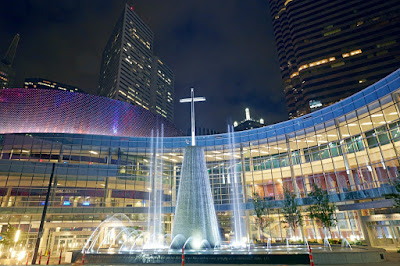Growing health and effectiveness
Wednesday, May 12, 2021
Monday, May 10, 2021
Five Coming Church Splits by Carey Nieuwhof
Post pandemic, the church in the United States will not be the same. Here are some coming church splits that are likely to take place - and are already taking place. Your church will not be exempt!
Wednesday, May 5, 2021
The most important trait of a church leader
Consider:
Humility is the key to leading on behalf of Jesus, the Shepherd of the Church. Church leaders are under shepherds and their role is to lead the congregation on behalf of Jesus. He sets the agenda for the church, not us. Many church leaders have agendas for the church. It takes a humble, Christ centered leader to lead a people to where God wants them to go.
Humility is the key to ensuring that a church is a "Church called TOV" to use the title of a recent book. TOV is the Greek word for goodness and too many churches are not places of goodness (amazingly enough). It is often the lack of humility among senior leaders and board members that prevent TOV from being the prevailing culture because other personal agendas get in the way of God's agenda.
Humility is the key to treating others with dignity, respect, kindness, and to empower others to flourish in their God given lane with their God given gifts. Proud leaders control others. Humble leaders empower others. The need of a leader to get their way, control those around them and "use" people for their own purposes destroys a TOV culture.
Humility is the key to creating an open learning culture. Proud leaders don't listen to others. They listen primarily to themselves or the yes people they surround themselves with. It takes humility to create a culture of robust dialogue - where any issue can be put on the table with the exception of a hidden agenda or a personal attack.
Humility is the key to making decisions because the best decision making is not by one person alone but by a group of called, gifted leaders. Which means that there are times that I must submit my preferences to the decision of others. That takes humility and a theology of the giftedness of the group.
Humility is the key to personal spiritual growth and ongoing transformation. Proud people think they have it all together while humble leaders are very aware of their need for ongoing growth and transformation. And, they are willing to go there because they are not stubbornly holding on to their pride. There is no true personal growth without a spirit of humility.
None of this should surprise us as Paul points out in Philippians 2 that humility is a core feature of Jesus himself. In fact, in Matthew 11:29, Jesus says, "I am gentle and humble in heart." How many of us can say that about ourselves? How many church leaders and pastors can claim the same? Without humility we cannot be like Jesus or lead like Jesus.
Tuesday, May 4, 2021
What should you know about a church if you are considering a pastoral or staff position?
I had an interesting call today from an old friend. He is interviewing for an associate pastoral position (in this case a campus pastor) and his question was a good one. How do I determine the health of the church since what is seen on the outside is often not what one finds on the inside. This last truth can become a source of real pain when one realizes the level of dysfunction that exists - in many churches.
The first thing I suggested is that he read A Church Called TOV which is the best book on what dysfunctional and healthy churches look like. In fact, if I were a potential candidate I would be interested in knowing whether the senior leader and the board had read this book, and if so, what their observations or learnings were.
In general, I would want to scope out the following information.
- What is the health of the board? Congregations and staff cultures rarely rise above the health of the church board. How would they describe their board health? Is the board unified and healthy in their relationships? Does the board have a written board covenant that delineates how they do their work and that hold board members accountable?
- If you are applying for a senior pastoral position, what is the relationship of the board to their senior leader? Is it a permission granting leadership paradigm or a permission withholding paradigm? Is the senior leader a colleague on the board or simply an employee of the board? Are there any powerbrokers on the board who have the power to determine what does or does not happen?
- What is the vision/preferred future of the ministry? What you want to learn here is whether the senior pastor and board have clarified what it is that they are chasing after. Or, if they are simply doing accidental ministry. If they have a picture of the preferred future, what is their plan for getting there and how would they evaluate their progress?
- How does the board, staff and congregation deal with conflict? Do they bury it or deal with it and if so how? Do they have healthy conflict resolution practices? Are there any elephants in the room, areas of conflict that exist but are not being addressed?
- What is the health of the staff. Often you need to talk to other staff people about this. I would want to know how the senior leader treats staff, whether he/she empowers or controls and whether there is an open and candid culture where any issue can be put on the table with the exception of hidden agendas or personal attacks. I would ask other staff if there are issues that one cannot put on the table. They will know. I would want to know from other staff the positive side of the culture and the negative side. I ask want permission to speak with a number of staff to understand the culture from their perspective. If a senior leader is unwilling to give you that permission it is a sign that not all is well.
- Regarding staff culture, is there significant alignment of staff around common values, ministry direction and priorities? Or, do individual leaders simply do what is right in their own eyes?
- I would want to understand the vision of the leaders for disciplemaking, staff culture, local and world outreach, diversity, generosity, community impact and those things that I believe are important for a church to pursue.
- What is the history of the church? What have the high points been and the low points? Where are they in the life cycle of an organization today? On the decline, plateaued or moving forward?
- What is the leadership style of the senior leader? Do they empower their staff to do their work or do they micromanage, change and control what staff does? Are they secure in themselves, generous in giving opportunity away and treating staff with dignity, respect and appreciation? Or, are they ego driven, insecure and threatened by other strong and competent individuals.
Monday, May 3, 2021
China continues its relentless assault on Christianity
China shuts down Bible App, Christian WeChat as new crackdown policies go into effect
Saturday, May 1, 2021
Minister to India today through prayer
God's heart is deeply grieved today as He watches the pain and suffering in India due to Covid. Imagine having a husband, wife or relative who is desperately sick and there are no hospital beds - anywhere! Imagine watching your loved one struggle to breath and there is no oxygen to be had! Imagine that there is nothing you can do as you watch your loved one die with no hope, no medicine, no oxygen, no pain relief.
CNN reported the following:
"India on Saturday reported 401,993 new coronavirus cases for the previous 24 hours -- the first time the country has surpassed 400,000 cases in a single day.
That brings the country's total Covid-19 caseload to more than 19 million since the pandemic began, and marks the 10th consecutive day of more than 300,000 daily cases, according to a CNN tally of figures from the Indian Ministry of Health. It's the first time any country has recorded more than 400,000 cases in a single day.
India also reported another 3,523 related deaths, taking its total death toll to 211,853. It is the fourth day in a row the daily number of deaths has exceeded 3,000.
As of Friday evening local time, 154,854,096 vaccine doses had been administered. A total of 27,889,889 people had received their second doses -- equal to 2.1% of India’s population of 1.3 billion people, according to a health ministry news release.
India launched its vaccination drive on January 16, and expanded the program to everyone above the age of 18 on Saturday."
Pray for India because God's heart is with the hurting. And our hearts should be like Jesus. Pray for the church there that is struggling to meet its own needs and at the same time minister to people around them who have no hope. Pray that in this time of hopelessness that many would find hope in Jesus.
But above all, pray. As we care about those things that God's heart cares about, we become more like Him. Perhaps as you pray, God will show you ways that you can make a difference. If not, prayer is still the main thing.
The pictures above were taken by me as I travelled in India many times. A wonderful, beautiful people with a vibrant church that lives in many places with great persecution.












